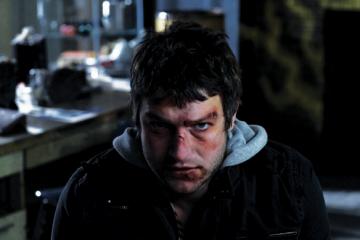Rock-bottom sci-fi flick 'Zenith' just underwhelms
The weird new sci-fi movie "Zenith" contains more implicit and explicit consumer warnings than a Viagra commercial.
The first is in the opening credits, where Vladan Nikolic is billed as "Experiment Supervisor," rather than director. Next comes a prefatory disclaimer: "The filmmakers shall not be liable under any legal theory for any direct, indirect or consequential damages that may be suffered by any viewers of this film in connection with, or as a result of, the information or sound or visuals herein."
And call your doctor if you experience a perplexion lasting longer than four hours.
So, like the final reminder that the flight's going to Pittsburgh, in case you were dumb enough to have stumbled on the wrong plane -- we can't say they didn't warn us.
If you're dumb or curious enough to stumble into "Zenith" ("the film they don't want you to see"), you should know it concerns "the conspiracy behind it all" -- pretty much everything from the Freemasons' one-world government to the JFK assassination and Obama's birth certificate, plus maybe those radio-transmitter implants in your dental fillings.
Frankly, it's kind of a relief to find out it's all coming from the same one-stop conspiracy.
In "Zenith's" Bleak New World of the year 2044, human beings have been genetically enhanced to experience a stupefied state of permanent happiness. Everybody's happy, 24/7, tuned into the All-Happy, All-the-Time Station. Which is, of course, boring to the point of clinically depressing.
Jack (Peter Scanavino) -- our dope-dealing hero-narrator -- feels their lack of pain. He offers a remedy in the form of black-market drugs (heavy-duty prescription tranks that expired 30 years ago), which bring his customers some welcome relief from their numbness. But one unhappy day, he gets a mysterious videotape of and from his dead father
Ed (Jason Robards III), a rebellious ex-priest who set out to unmask the masters of this dystopia. An invisible secret society called Zenith is behind it, having concentrated all world power and profit in the hands of a nefarious few.
The Zenith quest ended up driving Ed to the loony bin, and threatens to do the same for Jack in the course of this steam-punk thriller about two men in two different time periods, both searching for the same grand conspiracy as well as their own essential humanity. Their parallel stories run concurrently, cutting back and forth between Jack in the future-present and Ed in the present-past.
Steam-punk (for you old fogies out there) is a sub-genre of science fiction that gained popularity in the 1990s, employing speculative history or anachronistic technology (such as Victorian-era steam power) to create a typically down-and-out vision of the world-to-be. The makers of "Zenith" call theirs "retro-futuristic" -- an oxymoronic, almost-but-not-quite ironic term, on the order of "proto-apocalyptic" or "neo-archaic."
Are you still with me here?
"Zenith," in any case, invents a dense, grim world of junkyards and dead warehouses in the wasted remnants of what used to be Brooklyn. It opens with a re-creation of Stanley Milgrim's infamous Obedience to Authority experiment, circa 1963, and then dovetails into Jack's real concern: How and why language has disappeared -- specifically, words such as "solace" and "consciousness" and "perception."
Along the way, in the course of Jack's and Supervisor Nikolic's ruminations, we are treated to such ideas as the following, from Dag Hammarskjold: "God does not die the day we cease to believe in a personal God. But we die the day our lives cease to be illuminated by the radiance of wonder."
Who, under 70, even vaguely remembers Dag Hammarskjold, the late great United Nations secretary general, these days? It is wonderfully ponderous food for thought -- if perhaps not wonderfully compelling movie material.
Ana Asensio isn't too compelling, either. She plays Lisa, Jack's melancholy sex object, who is plenty melancholic but not too plenty sexy. Mr. Scanavino, as Jack, is fine.
One can't quite say "like father, like son" for Jason Robards III -- either in physical resemblance or in "Long Day's Journey Into Night" histrionic abilities.
All in all, despite some intriguing moments and images, this brooding, paranoiac sci-fi trip is a semi-indecipherable "Donnie Darko" wannabe -- a cult favorite in search of a
cult, possibly to be found among post-New Age-Goth-slacker-youths with many piercings.
Spiro Agnew would've called "Zenith" the nattering nadir of negativism.






